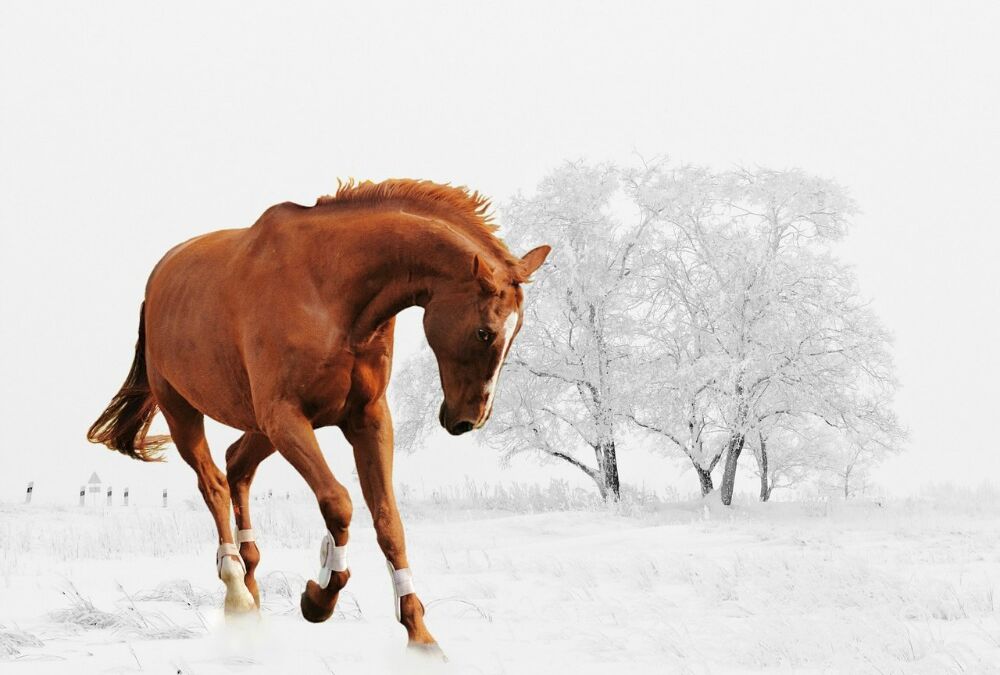By Phillipa
It’s a wonderful thing to ride out on a frosty morning, with the winter sun casting a beautiful light on the landscape.
But the reality is there are many days where caring for your horse during the colder months can feel like a thankless task. If both you and the horse are wet, cold and miserable, horse ownership suddenly becomes a real chore.
We think the best way to face winter with your equine is to be prepared and get into a routine that takes care of the basics.
The paddock;
With rain and snow, we inevitably get poached areas in the field, usually by the entrance and where the water trough is. It may be worth putting some hardcore down in these areas, and if possible moving the trough around a couple of times during winter.
Talking of water troughs, these must be checked at least once a day as they can easily ice over and if this is the case it should be broken to allow the horses access to the water. Also, just keep an eye on how much they are drinking. Quite a few horses don’t like very cold water and will go thirsty rather than drink it. If that’s the case, you may need to take a small tank of warm water to mix into it.
Horses do need shelter in extreme weather. Unless you are lucky enough to have a large, undulating paddock with lots of trees and other natural shelter so that they can stand in a dip and shelter under trees, then you should consider investing in a
field shelter. Even our lovely, roughty-toughty native breeds will appreciate being able to get out of the wind and driving rain every so often.
Health;
The chances are your horses will get less turnout time, so access to grass will be limited; what grass there is will have less nutritional value so giving them extra hay at turnout time is a good idea. I used to dot smaller piles of hay randomly around the field, so my boy had to move about which helped keep him warm and gave him a little exercise
Rugging is a subject that often causes heated debate, but you know your horse. With a field shelter available a highland or a shire may be perfectly happy unrugged. If this is the case, don’t overgroom them – yes they need to be kept in a healthy condition but a little of that dirt and old coat they have on them may help keep them warm. If you have a thoroughbred or one of the ‘finer’ breeds of horses or if you clip your horse, you will want them rugged. The same goes for older or unwell equines. But please make sure you take the rug off once a day to check them over for sore patches or any other health indicators that you might otherwise miss.
When they are stabled, ensure they have plenty of bedding and that they have a little ventilation.
Riding & Exercise;
If you do get one of those amazingly beautiful frosty mornings to ride in as I mentioned at the beginning of this post, then go and enjoy, lucky you. But if it’s dull and grey and raining and windy and you just can’t bear the thought of saddling up and riding yourself, put your horse on the lunge and get him moving and warming himself up, or maybe use a horsewalker if you have access to one.
You should also make sure you are looked after yourself. If you don’t have good quality insulated gloves, hats, scarves, jackets, socks and boots to keep you nice and toasty when riding or working with your equine, you may well be tempted to give up and go home early and miss out not just on ensuring the horse gets exercised, but you will end up spending less time enjoying being with him.
Finally, make sure you have a plan B. At this time of year there is a greater chance that you may fall ill with flu like viruses or even that you may get snowed in! If this is the case, who do you have on standby? Is there someone totally reliable that you know is close enough to where your horse is stabled who can get out and look after him at short notice? It’s definitely worth sorting this out now as the knowledge that you have all bases covered will give you enormous peace of mind.

